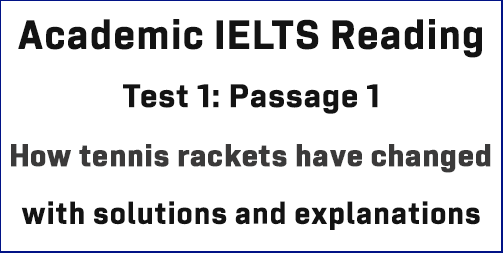IELTS Academic Reading: Cambridge 14, Test 4: Reading Passage 1; The secret of staying young; with best solutions and detailed explanations
This IELTS Reading post focuses on all the solutions for IELTS Cambridge 14 Reading Test 4 Passage 1 which is entitled ‘The secret of staying young’. This is an aimed post for candidates who have major problems in finding Reading Answers. This post can guide you the best to comprehend every Reading answer without much difficulty. Tracing IELTS Reading answers is a slow process and I sincerely hope this post can assist you in your IELTS Reading preparation.
IELTS Cambridge 14 Test 4: AC Reading Module
Reading Passage 1:
The headline of the passage: The secret of staying young
Questions 1-8: (Completing notes with ONE WORD ONLY)
[In this type of question, candidates are asked to write only one word/ no more than two words to complete a note on the given topic. For this type of question, first, skim the passage to find the keywords in the paragraph concerned with the answer, and then scan to find the exact word.]
Title: Ysabel Giraldo’s research
Question 1: Focused on a total of _________ different age groups of ants, analysing
Keywords for the question: focused, total, age groups, ants
The answer is in paragraph no. 3 in the very beginning in lines 1-2, “In the lab, P. dentata worker ants typically live for around 140 days. Giraldo focused on ants at four age ranges: 20 to 22 days, 45 to 47 days, 95 to 97 days and 120 to 122 days.”
So, the answer is: four / 4
Behaviour:
Question 2:
- how well ants looked after their ___________
Keywords for the question: how well, ants, looked, after
The answer is in the first line of paragraph no. 4, “Giraldo watched how well the ants took care of the young of the colony, .. . ..”
Here, took care = looked after
So, the answer is: young
Question 3:
- their ability to locate ___________ using a scent trail
Keywords for the question: ability, locate, using, scent trail,
The answer is found in lines 2-3 of paragraph no. 4, “.. ..She compared how well 20-day-old and 95-day-old ants followed the telltale scent that the insects usually leave to mark a trail to food.”
Here, mark = locate, how well = their ability,
So, the answer is: food
Question 4:
- the effect that _______ had on them
Keywords for the question: effect, had on them,
The answer can be found in lines 3-4 of paragraph no. 4, “She tested how ants responded to light . .. .”
Here, how ants responded = the effect ..…. had on them
So, the answer is: light
Question 5:
- how _________ they attacked prey
Keywords for the question: how, attacked, prey,
The answer is in the last lines of paragraph no. 4, “.. ..And when it came to reacting to prey, the older ants attacked the poor fruit fly just as aggressively as the young ones did, .. ….”
Here, attacked the poor fruit fly = attacked prey,
So, the answer is: aggressively
Brains:
Question 6:
- comparison between age and the ___________ of dying cells in the brains of ants
Keywords for the question: comparison, age and, dying cells, brains of ants,
Paragraph no. 5 talks about the research on ants’ brains. Here, in lines 1-3, the author says, “Then Giraldo compared the brains of 20-day-old and 95-day-old ants, identifying any cells that were close to death. She saw no major differences with age, nor was there any difference in the location of the dying cells, .. ..”
So, the comparison was between ants’ age and location.
So, the answer is: location
Question 7:
- condition of synaptic complexes (areas in which _______ meet) in the brain’s ‘mushroom bodies’
Keywords for the question: synaptic complexes, mushroom bodies,
The answer is found in lines 4-6 of paragraph no. 5. The author says here, “Ants and other insects have structures in their brains called mushroom bodies, which are important for processing information, learning and memory. She also wanted to see if ageing affects the density of synaptic complexes within these structures – regions where neurons come together.”
Here, synaptic complexes mean the region of ant’s brain where neurons come together or meet.
So, the answer is: neurons
Question 8:
- level of two ________ in the brain associated with ageing
Keywords for the question: level of two, associated with ageing,
The answer is in lines 7-9 where the author talks about two chemicals. “.. .What was more, the old ants didn’t experience any drop in the levels of either serotonin or dopamine – brain chemicals whose decline often coincides with ageing.”
Here, serotonin and dopamine are the two chemicals, coincides with ageing = associated with ageing,
So, the answer is: chemicals
Questions 9-13: In this type of question, candidates are asked to find out whether:
The statement in the question agrees with the information in the passage – TRUE
The statement in the question contradicts the information in the passage – FALSE
If there is no information on this – NOT GIVEN
[For this type of question, you can divide each statement into three independent pieces and make your way through with the answer.]
Question 9: Pheidole dentata ants are the only known animals which remain active for almost their whole lives.
Keywords for the question: Pheidole dentata, only known animals, remain active, almost, whole lives,
The answer lies in the first lines of paragraph no. 2, where the author mentions ‘naked mole rats’. “Naked mole rats can live for almost 30 years and stay fit for nearly their entire lives.”
So, Pheidole dentata ants are not the only known animals which remain active for almost their whole lives.
So, the answer is: FALSE
Question 10: Ysabel Giraldo was the first person to study Pheidole dentata ants using precise data about the insects’ ages.
Keywords for the question: first person, study, Pheidole dentata, using, precise data, ages,
The answer is in paragraph no. 3 in lines 2-4, “. … . ..Unlike all previous studies, which only estimated how old the ants were, her work tracked the ants from the time the pupae became adults, so she knew their exact ages.”
Unlike all previous studies means the research works done by previous scientists did not use data about insects’ age, and naturally Ysabel Giraldo was the first to do so.
So, the answer is: TRUE
Question 11: The ants in Giraldo’s experiments behaved as she had predicted that they would.
Keywords for the question: ants in Giraldo’s experiments, behaved, predicted, they would,
In paragraph no. 5, the answer lies in lines 6-7, “She also wanted to see if ageing affects the density of synaptic complexes within these structures – regions where neurons come together. Again, the answer was no.” Previously, in the same paragraph, lines 1-3 suggest that Giraldo wanted to identify any cells that were close to death but she saw no major differences with age.
This means the experiments did not show results as she expected.
So, the answer is: FALSE
Question 12: The recent studies of bees used different methods of measuring age-related decline.
Keywords for the question: recent studies, bees, different methods, measuring age-related decline,
In paragraph no. 6 we can see the reference of ‘bees’. But we do not find clear information on whether the recent studies of bees used several methods of measuring age-related decline.
So, the answer is: NOT GIVEN
Question 13: Pheidole dentata ants kept in laboratory conditions tend to live longer lives.
Keywords for the question: Pheidole dentata ants, kept in laboratory, live longer,
The answer is in paragraph no. 7. In the first lines the writer states, “Out in the wild, the ants probably don’t live for a full 140 days thanks to predator, disease and just being in an environment that’s much harsher than the comforts of the lab.”
These lines suggest that ants kept in laboratory conditions live longer than ants living in the wild.
So, the answer is: TRUE
Click here for solutions to Cambridge 14 Test 4 Reading Passage 2
Click here for solutions to Cambridge 14 Test 4 Reading Passage 3




Most useful app, I find it
Hallo
Please do fevour on me that I obtain to improve my bNd score in reading ??
Dear Rimpy,
YOu need to explain how you need my help.
Hlo I want to join online IELTS classes . If u provide class plz tell m about full detail of ur classes. Thxo
contact me on my email: ieltsdeal@gmail.com
Yss
A mere correction to the answer 11. For sure it is a false answer, but the proof has to be “ Giraldo expected the older ants to perform poorly in all these tasks. But the elderly insects were all good caretakers and trail-followers“. P 4 line 6.
It should be a bit different from what above written.
GOOD GOOD
yes you are right while reading his explanation i realized he highlighted wrong sentence
Sir I want to ask you that you provide online classes or not?
I think so bro
Hi
I have problems with comprehension. Do you have any suggestions?
Question 12, 13 were pain in the neck. The former one is confusing and the latter one is not clearly stating that they live longer or not. They are just mentioning how comfy their labs are. They are just playing on the test takers nerves.